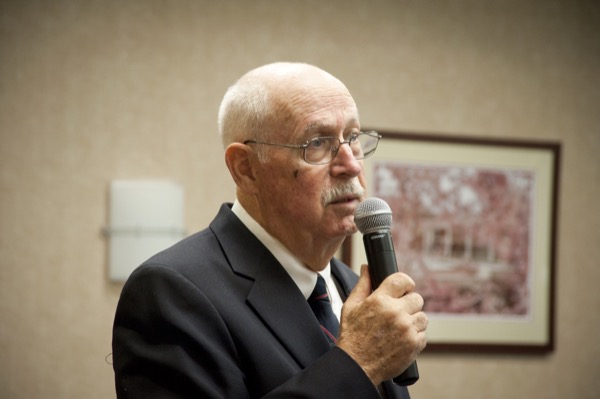
Intellectual journey
Wolters shares a half-century of teaching and researching history at UD
11:30 a.m., Nov. 11, 2014--Coming from the Golden State to the First State in 1965, Raymond Wolters embarked on a half-century-long teaching, research and writing career at the University of Delaware.
Wolters, the Thomas Muncy Keith Professor Emeritus of History, shared his experiences with retired faculty members during a “My Intellectual Journey” lecture sponsored by the UD Association of Retired Faculty (UDARF) on Thursday, Oct. 30, in the Courtyard Newark-University of Delaware campus hotel.
People Stories
'Resilience Engineering'
Reviresco June run
“From 1944 until 1956, I attended Catholic schools in Los Angeles County, and my life revolved around activities at either the schools or my local parish,” Wolters said. “At St. Francis High School near Pasadena, most of the teachers were Capuchin priests from Ireland, and never since have I known a better company of men.”
Wolters said he dedicated his book, Dubois and His Rivals, published by the University of Missouri Press in 2003, to the memory of five of these teachers.
Having earned an undergraduate degree in history at Stanford University in 1960, Wolters arrived at the University of California, Berkeley, with every intention of being a successful law student.
“My parents were pleased when I enrolled as a student at Boalt Hall but they were not pleased, to put it mildly, when I decided after only one month in law school to transfer into Cal’s graduate program in history,” Wolters said. “My parents had both worked in business, and neither could understand why I wanted to become a professor instead of a lawyer.”
When it came time to write a doctoral dissertation, Wolters asked Charles Sellers, professor emeritus of history at Cal, to be his major professor.
“I did so because Prof. Sellers was both an outstanding historian and a civil rights activist who was then serving as the president of the Berkeley chapter of the Congress of Racial Equality (CORE),” Wolters said. “I joined Prof. Sellers in one demonstration in Berkeley, where I carried a sign that urged blacks, ‘Don’t Buy Where You Can’t Work.’ I also participated in other civil rights demonstrations in Oakland and San Francisco.”
Invited to join the UD Department of History in 1965 by the late John Munroe, then department chair, Wolters began a career that spanned nearly five decades before retiring this year.
Early books by Wolters included works on blacks and the Great Depression and the black college rebellions of the 1920s.
Wolters noted that his best-known book, The Burden of Brown: Thirty Years of School Desegregation (University of Tennessee Press, 1984) won a notable award and drew both praise and criticism from reviewers.
“I told the story of how education had fared in the five school districts, including Wilmington, Delaware, that were ordered to desegregate as a result of the U.S. Supreme Court’s 1954 Brown v. Topeka Board of Education decision,” Wolters said. “The prevailing approach among historians had been to hail Brown as a landmark that sounded a death knell for racial segregation, but little had been written about how school desegregation had actually worked out.”
One reviewer remarked that Wolters’ writing style resembled that of Sgt. Joe Friday, the hard boiled detective of the TV show Dragnet known for his “just the facts, ma’am approach.” Others praised the book for showing what the ruling meant to “real people in real schools.”
Another reviewer wondered whether the book’s author was a blasphemer or a voice of loyal opposition to the reigning consensus in favor of busing to achieve racial balance.
“In 1985, the American Bar Association, which previously had supported everything the federal courts had required in the name of desegregation, gave its annual Silver Gavel Award to The Burden of Brown,” Wolters said. “The awards committee said ‘the award was made for literary merit and for shedding interesting light on legal history and issues.’”
Wolters, whose approach to research had been to search collection after collection in person, was forced to pursue an alternative approach when sidelined with a serious illness in 2010.
“I then scrapped my plans to go on the road for interviews and for research in primary sources because it was the only thing I could do at the time,” Wolters said. “I discovered a trove of information on the World Wide Web while waiting five months for a lung transplant at the Duke University Medical Center.”
Walter’s latest work, The Long Crusade: Profiles in Educational Reform (Washington Summit Publishing, 2014), is due for release on Dec. 5.
“The body of this book consists of biographies of nine of America’s most prominent school reformers, and of three critics of school reform,” Wolters said. “My intent is to provide readers with enough information to draw their own conclusions as well as to understand my views.”
Looking back from the perspective of half a century, Wolters reflected that coming to UD was the best choice he could have made.
“I am grateful to the University of Delaware for giving me the opportunity to teach good students and the freedom to disregard some of the academic orthodoxies of our time and to write history as I saw fit,” Wolters said. “I believe that, for me personally, there probably was no better university anywhere.”
Article by Jerry Rhodes
Photo by Wenbo Fan








